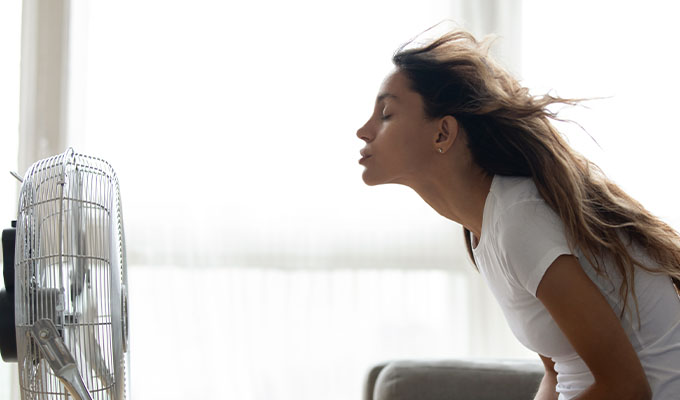Skin & Humidity: What You Need to Know


Many people experience dry skin during the winter, but warm summer weather causes problems of its own. On top of the risk for sun damage, summer heralds in a season of heat and humidity that can be problematic for your skin. You might think the extra moisture in the air would be good for your skin, but it does come with certain challenges and recommended changes to your skincare routine.
Both low and high humidity levels can cause changes in your skin. It’s important to pay attention to your skin through the changing seasons and to make adjustments to your skincare routine based on where you live. Here’s what you need to know about humidity and how it affects your skin.
Understanding the Basics About Humidity
In order to understand how humidity affects the skin, you first need to understand what it is. The term humidity refers to the amount of water vapor in the air. A high humidity level indicates a high concentration of water in the air, and it is often associated with higher temperatures. When the humidity level is high, the air can feel damp, and it can leave your skin feeling sticky or sweaty.
When it comes to understanding the effects of humidity on your skin, it’s best to consider relative humidity. This term refers to the amount of water vapor currently in the air relative to the maximum amount of humidity the air can hold. Relative humidity is a more accurate term to use when talking about what humidity levels are desirable for the skin, especially indoors versus outdoors.
How Does Humidity Affect Skin?

If you live in a cold, dry climate, you’re probably used to low humidity levels. Though low humidity levels may be preferable for people with naturally oily skin, it’s not all good. Low humidity levels, especially in cold climates, can strip the skin of much-needed moisture. Because the skin isn’t properly moisturized, it may become more difficult for it to shed dead skin cells. This results in a buildup of dead cells on the surface of the skin which can clog the pores and interfere with the absorption of skincare products.
When your skin is dehydrated, you tend to look older. Dehydration exacerbates the appearance of fine lines and wrinkles – it can also make your skin tone appear duller. Low humidity levels can also make your skin more reactive to allergies and existing skin conditions.
While low humidity levels can dry out the skin, high humidity levels often have the opposite effect. Due to higher moisture levels in the air, the skin is less likely to dry out. When the skin is moisturized, the process of cellular turnover is stimulated, increasing the rate at which dead cells are shed. This can lead to a brighter and more radiant complexion as well as the reduced appearance of fine lines and wrinkles.
Though high humidity levels are often beneficial for the skin, there are some potential downsides as well. High humidity levels are often associated with higher temperatures which can lead the skin to produce excess sebum. This excess oil is prone to becoming trapped on the surface of the skin which can leave your skin feeling oily and may increase your risk for breakouts. High humidity also creates favorable conditions for certain allergens like dust and mold to grow which can exacerbate allergies.
Tips for Protecting Your Skin Against Humidity
Before making adjustments to your skincare routine, determine whether you’re dealing with high or low humidity. If you live in a cool, dry climate you’ll need to take steps to boost your skin’s hydration and support the process of cellular turnover. In hot, humid climates your focus will be on controlling excess oil and supporting hydration without clogging the pores.
Here are some skincare tips for low humidity:
- Use a rich moisturizer cream with hydrating ingredients like hyaluronic acid, ceramides, and glycerin.
- Apply moisturizer immediately after cleansing when the skin is still damp.
- Drink plenty of water to keep your body and your skin hydrated.
- Exfoliate at least once a week to remove dead cells from the skin’s surface.
In addition to these skincare tips, you may want to install a humidifier in your home. These appliances can help you increase the relative humidity in your home to keep it from drying out. When you go outside, be sure to protect your skin from the elements by wearing gloves (if the weather permits) and other items of protective clothing as needed.
Here are some skincare tips for high humidity:
- Use an oil-removing cleanser to remove excess oil from the skin, so the skin is balanced.
- Exfoliate your skin on a weekly basis to help clear the pores and prevent breakouts.
- Switch to a lightweight moisturizer that will hydrate without clogging pores.
- Cleanse twice daily and shower after sweating to keep the skin clean.
- Avoid touching your face – you could transfer acne-causing bacteria by accident.
Just as you can use an air humidifier to increase the relative humidity in your home, you can use a dehumidifier to help reduce the relative humidity. Experts recommend an indoor humidity level between 30% and 50%. Not only is this level of humidity beneficial for the skin, but it will help prevent the growth of common environmental allergens like dust mites and mold.
The post Skin & Humidity: What You Need to Know appeared first on Yon-Ka Paris.
from Yon-Ka Paris https://ift.tt/3fqCl9I


Comments
Post a Comment